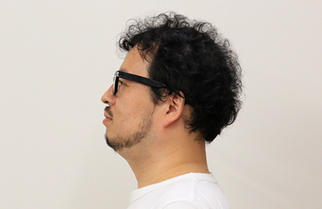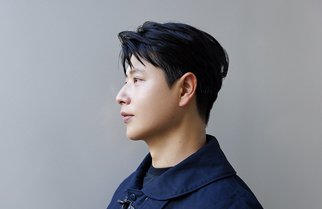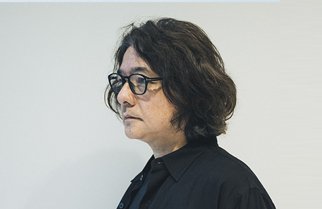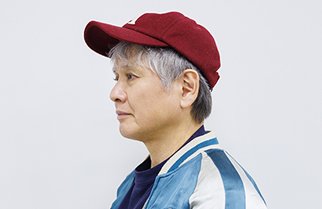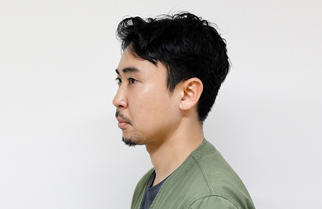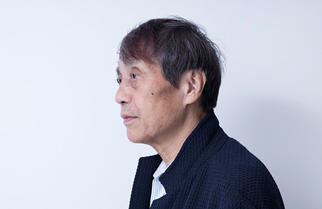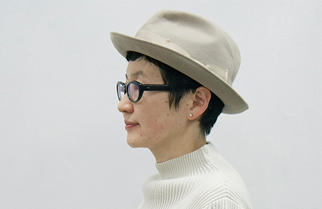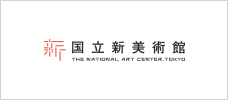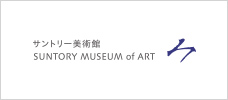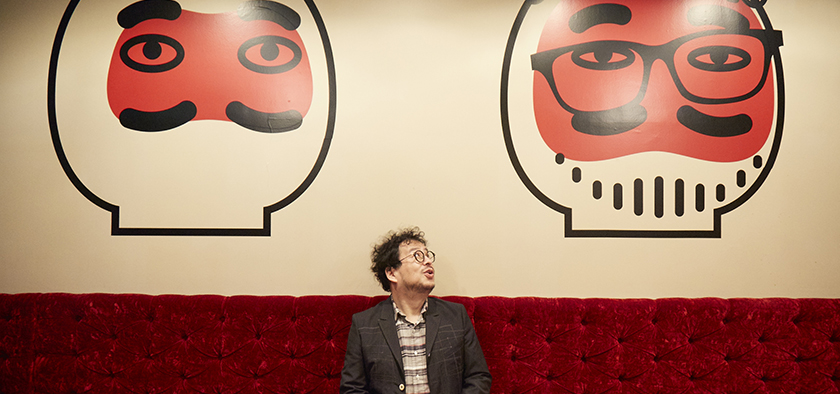
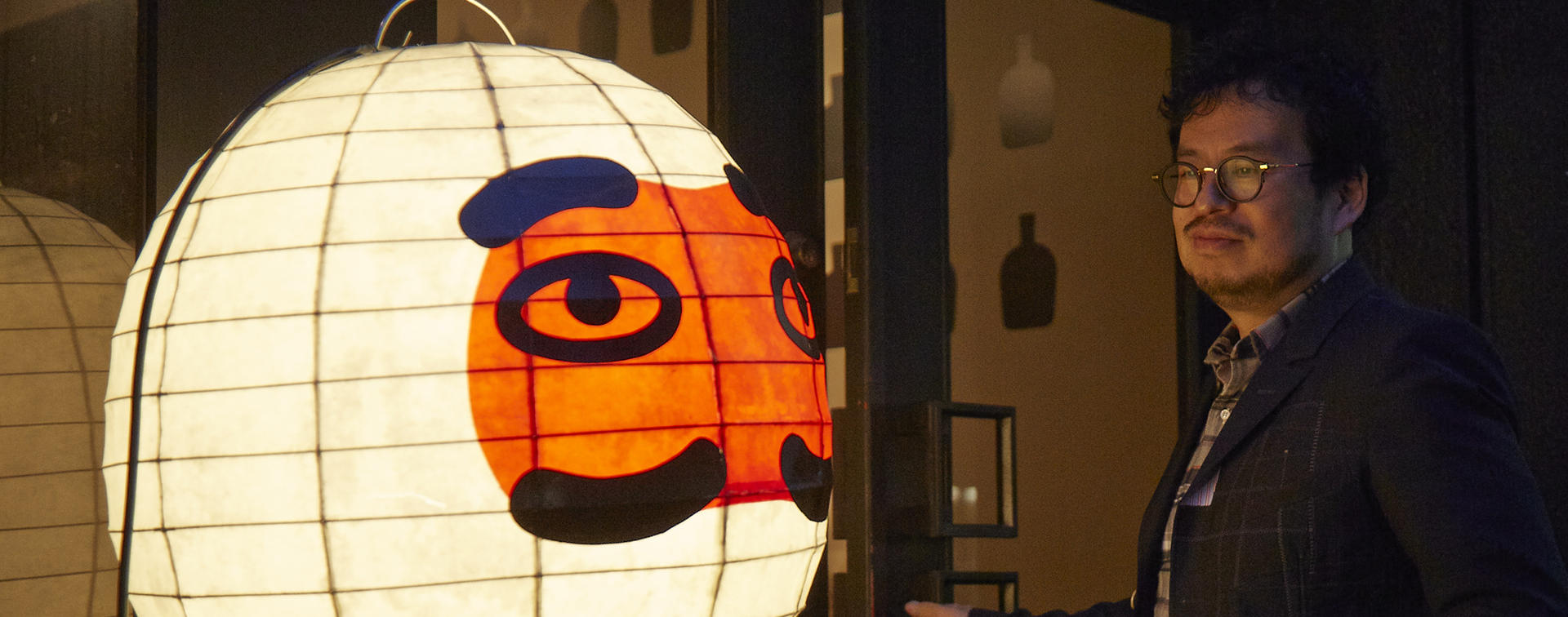
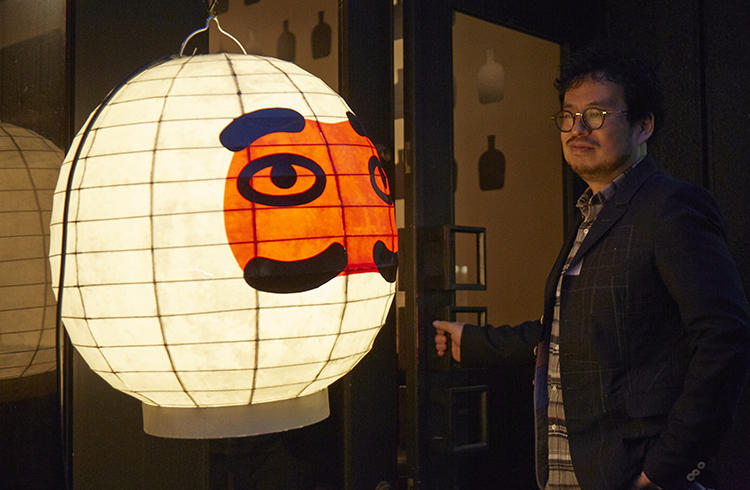
The power of copywriting and creating stories
Promoting exchange in Roppongi
Toshiyuki Konishi has made many memorable commercials such as those for Suntory's Iemon tea and Toyota Lexus cars. Konishi was the lecturer of the first class of "Roppongi Mirai Daigaku (Roppongi Future University)" - a series of classes held at Tokyo Midtown whose concept was conceived by art director Manabu Mizuno. In January 2016, Konishi published "Sugoi memo" (Amazing memos), a book detailing how he comes up with ideas for projects. We naturally asked him about ideas to change Roppongi. The interview and the photo shoot were held at Snack Daruma, a bar in Nishi-Azabu which is run by Konishi's company 'POOL'.
Blending of innovative culture and Showa era culture
My very first impression of Roppongi is that it was an area where it was impossible to catch a taxi. I started working at a company at a time when the bubble economy had just burst, and I would often go out drinking with my senpais (elders). But when it was time to go home, I had no luck getting taxi rides. I would hail a taxi and the window would open with a hum, and the taxi driver would ask "Where to?" I would reply "Yokohama," and he would say "How much?" and I would say "How about 40,000 yen?" and then the taxi driver would say, "You better find another taxi."
You couldn't get a taxi ride unless you had taxi tickets. It was a time when taxi drivers were at their most powerful. Recently, it's tough catching a taxi during the Christmas season but back then, it was like Christmas every day. My senpais liked the Italian restaurant Sicilia and we would go there almost every week. By the time it was twelve or one o' clock in the morning, it would be impossible to go home. So the senpais would take me to a hostess club where we would stay until three o'clock. You can see why Roppongi was a frightening place for me. (laughs).
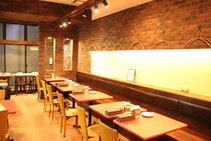
Sicilia
An Italian restaurant on the basement floor below the Almond cake shop at Roppongi intersection. Opened in 1954, the restaurant offers pasta and its signature pizza pies at reasonable prices. The tables are covered with red Gingham tablecloths.
In the old days, Roppongi had a dark, foreign atmosphere. But then Roppongi Hills was built, and Tokyo Midtown was built, there are now a lot of tourists and the place has become really clean. But when I go drinking with older men, they still want to go to the hostess clubs which surprises me a bit. I think, "Oh, you still go to hostess clubs?" (laughs). I like the way the two cultures blend though; there is a blending of the cutting-edge culture of the innovative companies in places like Roppongi Hills and Tokyo Midtown with the deep culture of the older men of the Showa era.
A frightening town where you can get "caught"
Having opened "Snack Daruma", I often visit Roppongi now. But it's not a good idea to come here when I have to get up early in the morning the next day, because I might get caught by someone. If Shima-kun (Koichiro Shima) - who joined Hakuhodo in the same year as me - happens to be here, he will say something like "I hope you are not thinking of going home." Our patrons include prominent copywriters and creative people like the people at Google and people who have offices nearby. It's fun to have so many acquaintances, but there are many intimidating older men who won't let me go home. Roppongi continues to be a frightening place for me. (laughs)
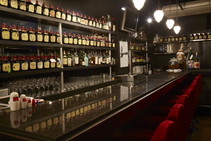 タグ
タグSnack Daruma
A snack bar owned by Toshiyuki Konishi located on the first floor of the Mihoya Glass Building on Roppongi-dori street. A paper lantern with an illustration of the Daruma doll hangs in the entrance. The bottles of "Suntory Old" whiskey lined up on the shelves are affectionately referred to as "daruma." The bar offers other beverages and a variety of snacks.
https://www.facebook.com/snack.daruma/
Snack Daruma is a "snack bar" but I initially wanted to set up a restaurant offering omelets and takoyaki. About 20 years ago, there was a restaurant I adored in the Kotsukaikan building in Yurakucho. Omelet lunches cost about 1,200 yen if you ordered yakitarako (grilled salted roe) on the side, but there was always a very long line outside the restaurant. I wanted to bring that restaurant back to life, but the restaurant experts I talked to dismissed the idea - they said it wouldn't be at all profitable.
Since the location is in the Roppongi neighborhood, they suggested that I set up a bar or a drinking establishment of the kind that I myself would want to go to. So I thought of setting up a new kind of snack bar - a bar that is like the usual snack bar but which is also a place where people could drop by for tasty food. We don't have omelet and yakitarako on the menu yet, but recently we hired a person who is a great cook, so perhaps one of these days, we will be able to offer them.
Karaoke for reading and appreciating the lyrics
In magazine articles, Snack Daruma is referred to as a snack bar where there is no karaoke singing. We have a karaoke machine but we don't have microphones. When we were preparing to open the bar, one of the staff at my office asked, "If it's going to be a snack bar, it will have karaoke, won't it?" And I said that it's irritating when people sing loudly and that I hate it. Then the suggestion was made to not have microphones, and I thought, "That's innovative."
It turned out that we made the right decision in placing a karaoke machine in the bar. When familiar songs are played, some people sing softly and others look at the lyrics on the karaoke screen, and reading the lyrics has become the culture of this bar. Maybe this is because I'm a copywriter, but by reading the words I come to a better understanding of the songs. I make discoveries and it's intriguing. Many of our patrons apparently feel the same way: some say they appreciate the meaningful lyrics, and others tell me they bought songs on iTunes.
I've always liked the pop songs of the Showa era, and I've long wanted to suggest ways to enjoy Japanese pops and enka. The other day, at the B&B bookstore in Shimokitazawa, Shima-kun and I held a talk event discussing the lyrics of Miyuki Nakajima. Since we got a very good response from the audience, we're planning to hold another talk session.

Encouraging exchange on a personal level
At Roppongi Mirai Daigaku, I talked about getting ideas through the "Izakaya Mix" method. I think it would be interesting to try that in Roppongi. We could ask the restaurants and companies and facilities here to come up with words to describe the kind of services they provide and what kind of unique staff they have. And then we could randomly combine those words with other words and make up words that have not existed before. And then we can make those words a reality. This is something that probably can't be done with pictures. You have to use words.
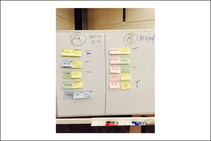
Izakaya Mix
A method devised by Toshiyuki Konishi for easily coming up with many ideas. It involves thinking of words to express the charactertistics of products and things, and combining them with words describing the preferences of the targeted users. Konishi came up with the method when scribbling on paper napkins in an izakaya.
People usually don't think much of the things they can do and so they don't talk much about them. But often, what a person can do is fascinating for other people. There must be a whole range of untapped talent and potential in Roppongi which none of us know about yet. I think that by using the "Roppongi Mix" method, we can find that hidden potential. We could have workshops or do this as a business.
A soba shop offers soba noodles, and Google offers web search services. If we put "soba" and "search" together, what do we come up with? We might also get phrases like "IT snack" or "hostess club design week" or even weirder word combinations. If our bar, with its karaoke for reading lyrics, teamed up with a company that has artificial intelligence technology, we might come up with something interesting. Or there could be collaborations between bars and children, or art and movies. It would be great if companies and restaurants, individuals and organizations could come together using a platform like Roppongi Future Talks. Instead of "Izakaya Mix" we would call it "Roppongi Mix". It reminds me of the good old song "Roppong Shinju". (laughs)
If we do it this way, all kinds of things will start mingling and flowing and there will be exchange between people. The bars and drinking establishments are places for people to meet, but we could make encounters happen outside of the bars. When holding an event in Roppongi, people usually think of holding an art exhibition because Roppongi has many art museums. Of course, events like Roppongi Art Night are wonderful, but we could also vitalize the area by doing something on a smaller, more personal scale, starting with around five or six establishments. I'm sure people will find it fun and would want to visit the establishments later.
Copywriting as a skill and tool
Copywriting is generally seen as being about advertising. When I tell people that I'm a copywriter, they assume I'm the person who writes the words for advertising posters. In reality though, copywriting for adverts probably makes up about a tenth of the whole copywriting genre. When it comes to design for example, architecture is seen as being about design; design consists of all kinds of genres such as editorial work, advertising and fashion. And to me, copywriting is similarly encompassing.
I think copywriting is the skill of using words to communicate to people so that things will go smoothly. I also think it's a tool for creating ideas. Copywriting is necessary for art and for the Web, and for the IT people who write codes; it's needed in politics and management and welfare. The world is made up of copies or words, and when you think of it that way, you realize that copywriting is useful in all kinds of places.
Recently, there are cases where creative directors work together with company leaders, getting involved in company management. Similarly, companies need to have copywriters. If you want to have clearly written internal documents, or if you want to create a simple concept, or if you want to announce something to the world, communication will definitely be made much easier if you have the content checked by a copywriter.
Every remarkable company has a copywriter
It's a fact that remarkable companies have people with good copywriting skills. For example, at Ippudo, which I'm involved with, there's a person who checks all the words that the company releases publicly. Thanks to that, Ippudo is a powerful brand even though it's not a big company. Ippudo founder Shigemi Kawahara-san has a very sophisticated sense for words; I'm reminded of Steve Jobs when I see how he cares about each punctuation mark. In our conversations though, we're always talking about food and debating things like how thick the slices of char siu (barbecued pork) should be. (laughs)
A copywriter works as an adviser and public relations person for a company and also creates internal messages and forms concepts that move people. I'm sure that if there were copywriters in all kinds of fields, things would go marvelously smoothly. I wish more people understood that. I write books like "Sugoi memo (Amazing memos)" because I want there to be a wider recognition for copywriting.
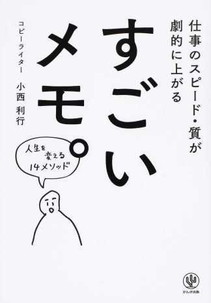
Sugoi memo (Amazing memos)
A book on how to effectively write memos and utilize them in work. Toshiyuki Konishi reveals how, in his career spanning more than 20 years, he has developed a method of writing memos to organize data, to come up with ideas and to motivate people. Published by Kanki Publishing.
I want people to know that the words copywriters use for communication have an effect on business. I want copywriting to be regarded like design - as one of the important skills in society. I want the profession to become established so that all kinds of people will aim to become copywriters. And ultimately, if possible, I want to make copywriting academic.
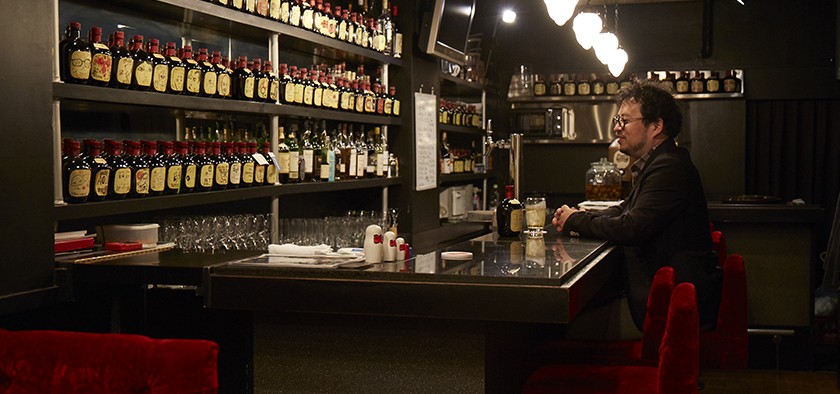
What lyrics and city development have in common
The things that interest me mostly recently are song lyrics and city development. I just realized now by saying "kashi to toshikaihatsu (song lyrics and city development)" out loud that it sounds like an anagram. (laughs) Song lyrics are essentially stories and that's why they can easily move people. The power of lyrics is awesome I think that city development is also about storytelling; it's about creating streets that resonate with people. I think stories are truly vital in making the world a better place. So I will like to be involved in creating stories through lyrics and city development.
I've written commercial song lyrics for products that I do promotion work for, and there are many lyricists who started out as copywriters. I've always had a longing to write lyrics, but somehow I've felt hesitant about it. After all, copywriting and writing lyrics are so different - just as soccer and baseball are both ball sports but very different. Sometimes when I'm drinking at Snack Daruma and look at the karaoke screen, I see some incredibly imaginative lyrics and feel awed. Still, I want to try. (laughs)
City development may sound like a big thing but setting up a restaurant is also about developing a city. Maybe it's better to say "creating streets" instead. I'm currently involved in a project to build a hotel in Kyoto. The conventional method would be for people in the architectural industry to do this, but I'm "building" the hotel by using copywriting skills. Since everything is essentially about storytelling, I'm writing the story for the kind of hotel I wish existed. The actual construction will take place based on the story.
Seeing things from the perspective of the user
In architecture, assumptions have already been made on so many things like the space of guestrooms, the location of elevators, what should be placed where, and what sort of space is necessary. But those assumptions have been made by the people who make the buildings, and the feelings of the people who use the buildings are often forgotten.
Thriving restaurants and hotels reflect customer feedback. They listen to people's wishes such as the desire for a certain kind of guest room or a certain kind of bar. They keep working on the requests and see things from the perspective of the user, and they inevitably end up with something pleasing. That's how stories are made, but most people don't seem to realize it and when they see how things are going well, they are surprised, and exclaim "How did you do it?"
The hotel I'm working on is, of course, going to be made by architects and run by professionals - various teams will be in operation. As the copywriter, I will have the role of presenting the principle. I will start by deciding on a concept expressed through extremely simple words. Then people will be able to use that as a guideline for deciding on the details and they will know whether something is too ornamental or too cheap-looking.
Making stories to prompt action
The High Line project in New York, which transformed a former rail line into a park, is a well-known case of successful city development. It's an idea that few people would have come up with, but there was someone who conceived the story of making a park that would draw lots of people. Nowadays the process of thinking about what people want is fundamentally the same as that for developing new products like beer or tea or clothing. Products, restaurants and architecture - the scale of each may be different but the process of development is the same.
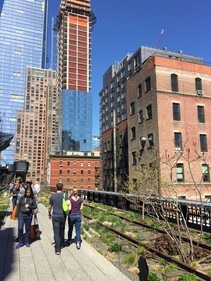
High Line in New York
A 1.6 km-long park in Manhattan built on the elevated section of a disused freight rail line. Opened in 2009, it has received wide attention as a new sightseeing spot. Pleasant scenery has been created by placing greenery and artworks among the rail line and railroad ties.
Photograph by ©Kohta Wajima
As I explained at at Mirai Daigaku, another way of saying "story" is "premise." What is the premise for someone to want something, or to take certain action? When I talk about the need for a story, people often say they don't know what they should do. Maybe it's easier to get ideas when you think of it in terms of creating the premise. When promoting a product, I write the copy by thinking about how the customer feels and what can be done to motivate a purchase. So I think about the premise and I write a message in line with that, and that prompts action in all kinds of people.
When I worked at an advertising agency, I wanted to be a marketer. Before that, I wanted to do city development, and before that, I wanted to become a pilot. But I had a series of setbacks and eventually became a copywriter - I have a disappointing resume. (laughs) Yet I'm now doing all the things I wanted to do in a messy way. I have a true love for advertising though, and I would never want to just say nice things about something and go away. I want to make sure that whatever I promote is genuinely good, and I want to see everything through to the end. I want to be responsible. Did that person buy this? Did it make the person happy? Did it really resonate? Those are the questions I want to keep asking.
Editor's thoughts
After the interview, the editorial staff drank Highball which is the specialty of Snack Daruma and read the lyrics on the karaoke screen. Konishi-san told us that the rivalry among Showa era singers can be categorized into "yin yang" pairs. For example, Akina Nakamori is a "yin" singer, while her rival Seiko Matsuda, is a "yang" singer. That is something I had never thought of before.
(edit_kentaro inoue)




